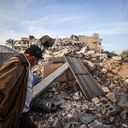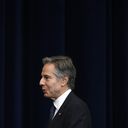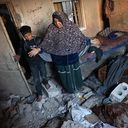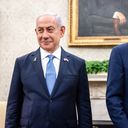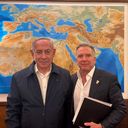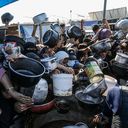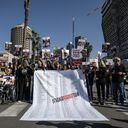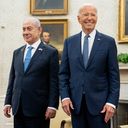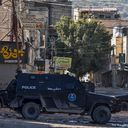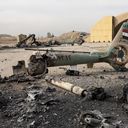Gaza hostage and ceasefire deal reached
A deal has been reached in the negotiations between Israel and Hamas to release hostages being held in Gaza and establish a ceasefire, according to U.S., Israeli, Egyptian and Qatari officials.
Why it matters: The agreement will end more than 15 months of the deadliest war in the decades long Israeli-Palestinian conflict.
- About 98 hostages are still being held in Gaza, among them seven Americans. Roughly half of the hostages, including three Americans, are believed to be still alive, according to Israeli intelligence.
- More than 46,500 Palestinians have been killed by Israeli forces since the Oct. 7, 2023 Hamas attack on Israel, according to the Ministry of Health in Gaza.
- The first phase of the deal calls for 33 hostages to be released along with around 1,000 Palestinian prisoners held in Israel.
The latest: Qatari Prime Minister Mohammed bin Abdulrahman al-Thani officially announced an agreement has been reached and said it will come into effect on Sunday. A joint U.S.-Egyptian-Qatari team in Cairo will monitor the implementation of the ceasefire agreement, he said.
- President-elect Trump on Truth Social said "we have a deal for the hostages in the Middle East."
In a statement announcing the agreement, President Biden said it "is the result not only of the extreme pressure that Hamas has been under and the changed regional equation after a ceasefire in Lebanon and weakening of Iran — but also of dogged and painstaking American diplomacy."
- Biden said several U.S. citizens being held hostage will be released as part of the first phase of the deal.
- Israeli officials said it will actualy be two U.S. citizens, Keith Siegel and Sagui Dekel-Chen.
- Biden said he is "confident" the deal will hold.
The Israeli cabinet will convene on Thursday morning local time to approve the Gaza hostage and ceasefire deal, officials said.
- Israel and Hamas haven't officially announced a deal, but NBC News reported senior Hamas official Basem Naim confirmed the militant group had agreed.
The big picture: The indirect negotiations between Israel and Hamas reached a critical point over the weekend, one week before Trump will be sworn into office.
- The President-elect has threatened there would be "hell to pay in the Middle East" if Hamas didn't release the hostages by the time he is inaugurated.
Israeli officials, Hamas officials and mediators from Qatar, Egypt and the U.S. have been working around the clock for several days in Doha to hammer out a deal.
- Biden's top Middle East adviser Brett McGurk and Trump's envoy Steve Witkoff have both been in Doha since last week and have been working together to push for a deal.
- Earlier this week, the mediators gave Hamas a final draft agreement.
- Hamas representatives in Doha signed off a few days ago but the parties waited for a response from Hamas' military leader in Gaza, Mohammed Sinwar, which arrived on Wednesday afternoon local time.
- The head of Hamas' negotiating team, Khalil al-Hayya, said in a speech from Qatar after the deal was announced that the Oct. 7 attack on Israel "will forever be a source of pride for our people... and our people will expel the occupation from our land and from Jerusalem in the earliest time possible"
Zoom in: According to the agreement, 33 hostages will be released in the first phase of the deal, including women, children, men over the age of 50 and men under the age of 50 who are wounded or sick. Israel's assessment is that most of those 33 hostages are alive.
- The hostages will be released gradually throughout the first phase of the agreement, beginning on the first day of the six-week ceasefire in Gaza.
During the first phase, Israeli Defense Forces will also gradually withdraw to a buffer zone in Gaza near the border with Israel. The IDF will leave the Netzarim corridor in the center of the Gaza Strip and most of the Philadelphi corridor on the border between Gaza and Egypt.
- Palestinians will also be allowed to return to northern Gaza during the first phase of the deal. Those who travel by foot won't go through security checks but vehicles will be checked by Qatari and Egyptian officials to ensure no heavy weapons are transferred to Gaza.
- Roughly 1,000 Palestinian prisoners will also be released, including about 200 accused of murdering Israelis. The exact number of prisoners to be released will be determined only after Hamas clarifies which of the hostages to be released are alive, Israeli official said.
- From the first day of the ceasefire, 600 aid trucks, including 50 fuel trucks, will enter Gaza every day. In addition, 200,000 tents and 60,000 mobile homes will be delivered for displaced Palestinians in Gaza.
- The agreement stipulates that Qatar, Egypt and the U.S. will serve as guarantors for the implementation of the agreement.
On the sixteenth day of the ceasefire, Israel and Hamas will begin negotiations on the second phase of the agreement, which is supposed to include the release of the remaining hostages and a permanent ceasefire and complete Israeli withdrawal from Gaza.
Editor's note: This is a developing story. Check back for updates.
